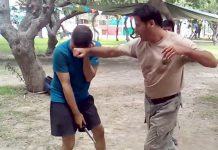 Working against multiple opponents in martial arts is challenging both psychologically and physically.
Working against multiple opponents in martial arts is challenging both psychologically and physically.
In Systema, there are a number of simple things to understand and practice to help you gain control over your external and internal opponents (i.e. your attackers and your own emotions).
- The first skill to acquire is moving away from the line of attack. It is important to learn not to freeze when a threat comes at you.
- If you are not very experienced in working against two or more opponents, your tendency will be to keep them in your field of vision all the time. You will find that fear and tension will not allow you to turn your back to the attackers.
- At this initial stage of training, get your partners to walk at you and just move away from them without making any contact. Keep up with continuous breathing and movement.
- As you get more comfortable, you can turn your back to them as well.
- The more you train in Systema the more you will be able to control any situation, regardless of the number of opponents, positions, types of attacks or weapons.
There is also further development to this drill.
- You begin with your partners walking at you at normal speed, then they accelerate, and finally they begin to run at you.
- This progression of speed will allow you to see that as the speed increases, your degree of fear and movement restriction increases too. Your goal is to realize that.
- Note your restrictions while the opponents are only approaching you, not even striking and you are not striking back, which would challenge your reaction and coordination even more…
Redirecting
When the opponents come at you and try to strike or kick as well, one of the effective strategies is to redirect the attacks in such a way that the opponents always end up hitting each other. Imagine if you were to get hit by your friend each time you are supposed to work together. Psychologically, it is unexpected and quite frustrating. As a result, a conflict develops between the two friends/co-attackers and they start to watch each other more since they have a common “enemy” so to speak. This allows you to dissipate the confrontation.
- Redirecting takes less physical effort than delivering strikes. Therefore, it is good to use that if you are tired, injured or wounded.
- If you move unexpectedly for the attacker, your moves will work well.
- All the movements should be smooth and continuous, steadily flowing from one partner to the next.
- It is very important in training to proceed gradually to higher speeds and with calmness and control.
- A word of caution here. When the work is quick, the danger for the attackers to get hit by the “friendly fire” is increased. During fast redirecting, fellow attackers can easily receive unexpected and unintended strikes from each other. This could lead to injuries, so be very careful when you practice redirecting.
- Fundamental to Systema, is being in a normal and natural position without any stances and without fear or tension. If you are able to maintain that, your opponents will not be afraid of you and they will come up closer. They will be
less prepared for your unexpected actions. Therefore, you have much more control over them.






